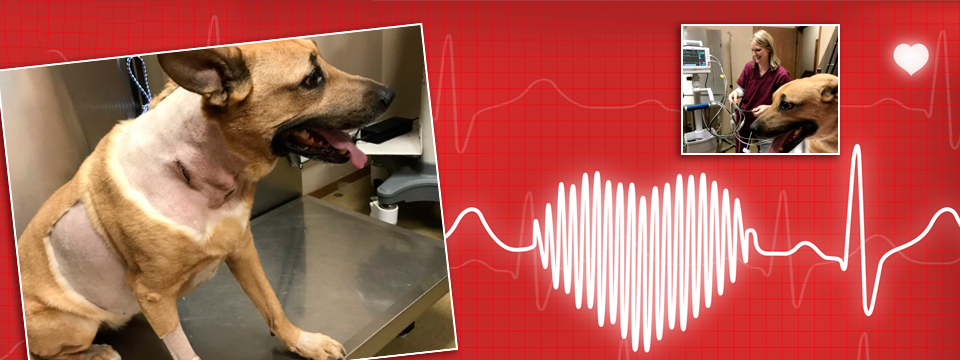
Medical issues suffered by a 9-year-old German Shepard mix recently proved the value of the specialty clinics at the Hixson-Lied Small Animal Hospital and working closely with area referring veterinarians.
Sadie was recently brought to the Den Herder Veterinary Hospital in Waterloo, Iowa. She had stopped being her usual active self and was lethargic to the point where getting up and walking was difficult.
Drs. Tom Taylor (DVM 2004) and Kealie Rogers (DVM 2017) evaluated Sadie and after an electrocardiogram the doctors suspected the dog had a serious heart issue called High-Grade Atrioventricular (AV) Heart Block, which causes the heart to beat much too slowly.
The Iowa State graduates recommended owners (Karen Kayser and Curt Klatt) take her immediately to the Hixson-Lied Small Animal Hospital where she was seen by cardiologist Dr. Jessica Ward and cardiology resident Dr. Shane Murphy.
“Sadie’s heart rate was only 35 beats per minute when she arrived at Iowa State,” Ward said. “Because we were very worried about her, we performed her procedure the day she arrived.”
The procedure was implantation of a permanent pacemaker, which is the standard care for people and dogs with high-grade AV block. Through a small incision in her neck, a long thin wire was passed into Sadie’s heart to provide electrical stimulation causing the heart to beat at a normal rate. The pacemaker’s battery pack is placed under the skin of the neck.
Ward says that as a cardiologist, pacemaker implantation is the treatment she performs for essentially every dog she sees with high-grade AV block.
“In fact,” she said, “the day we placed Sadie’s pacemaker, we actually did two pacemaker procedures.”
This was Ward’s seventh pacemaker she has implanted in a dog since she joined the Iowa State faculty two years ago and the third Murphy has completed in his first year of residency.
“While it’s relatively common for veterinary cardiologists to see dogs with this life-threatening arrhythmia, it’s certainly rare for general practitioners such as the veterinarians at Den Herder Veterinary Hospital,” Ward said.
Implantation of a pacemaker allows dogs not only to recover from their symptoms quickly but significantly improves long-term prognosis for patients with high-grade AV block. Without a pacemaker, dogs with this arrhythmia have an approximately 25% risk of dying suddenly within the first month of diagnosis and a 40% chance of dying with six months. With pacemaker implantation, barring complications, the dogs go on to live normal lives.
Sadie has made a quick recovery. She was released from the hospital the next day and within a week she went from barely being able to stand to up to being back with her family almost if nothing was wrong.
Her biggest daily change is she needs to wear a harness now, since a traditional collar could move or damage the pacemaker in her neck.
“It boggles the mind how animals have the power to heal so quickly,” a blog post on the Den Herder Veterinary Hospital’s website states. “Sadie and her family should have many more happy years together.”
November 2017
